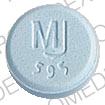Megace Disease Interactions
There are 5 disease interactions with Megace (megestrol).
Progestogens (applies to Megace) thromboembolism
Major Potential Hazard, High plausibility. Applicable conditions: History - Thrombotic/Thromboembolic Disorder, Thrombotic/Thromboembolic Disorder, Cerebral Vascular Disorder
The use of progestogens, in general, is considered by manufacturers to be contraindicated in patients with active thrombophlebitis, cerebrovascular disease, or a current or past history of thromboembolic disorders. While the role of progestogens in the development of thromboembolic events associated with hormonal therapy is often unclear and thought to be secondary to that of estrogens, it may not be insignificant. Medroxyprogesterone, a common progestational agent, has been shown to produce a hypercoagulable state in high dosages. Whether or not this effect contributes to the development of thrombotic events is unknown. However, thrombophlebitis and pulmonary embolism have been reported with megestrol, an antineoplastic and progestational agent. In addition, an increased risk of nonfatal venous thrombosis has been associated with oral contraceptive combinations containing desogestrel or gestodene relative to those that contain other progestins (e.g., levonorgestrel, norethindrone), suggesting some degree of hemostatic effect by progestogens.
Estrogens/progestogens (applies to Megace) fluid retention
Moderate Potential Hazard, Moderate plausibility. Applicable conditions: Congestive Heart Failure, Migraine, Seizures, Renal Dysfunction, Hypertension
Estrogens and progestogens may cause fluid retention, particularly when given in high dosages or for prolonged periods. Therapy with these agents should be administered cautiously in patients who have preexisting problems with excess fluid. In addition, patients with conditions that may be adversely affected by fluid accumulation, such as asthma, epilepsy, migraine, and cardiovascular or renal dysfunction, should be observed for exacerbation of their condition during estrogen and/or progestogen therapy.
Estrogens/progestogens (applies to Megace) retinal thrombosis
Moderate Potential Hazard, Moderate plausibility. Applicable conditions: Visual Defect/Disturbance
Estrogens and progestogens may cause retinal thrombosis. Oral contraceptives should be discontinued if there is unexplained partial or complete loss of vision; onset of proptosis or diplopia; papilledema; or retinal vascular lesions. Therapy with these agents should be administered cautiously in patients who have preexisting ocular problems and appropriate diagnostic and therapeutic measures should be instituted. Contact lens wearers who develop visual changes or changes in lens tolerance should be assessed by an ophthalmologist.
Megestrol (applies to Megace) diabetes mellitus
Moderate Potential Hazard, High plausibility.
Megestrol, like other progestational agents, can cause glucose intolerance. In addition, it may have glucocorticoid activity. New onset diabetes and exacerbation of preexisting diabetes have been reported in association with the chronic use of megestrol. Patients with diabetes mellitus should be monitored more closely during therapy with megestrol, and adjustments made accordingly in their antidiabetic regimen.
Megestrol (applies to Megace) hyperadrenocorticalism
Moderate Potential Hazard, High plausibility. Applicable conditions: Adrenal Tumor, Hyperadrenocorticism
Megestrol appears to have glucocorticoid activity and may aggravate conditions of hyperadrenocorticalism. Clinical cases of overt Cushing's syndrome and adrenal insufficiency have been reported in association with the chronic use of megestrol.
Megace drug interactions
There are 168 drug interactions with Megace (megestrol).
Megace alcohol/food interactions
There is 1 alcohol/food interaction with Megace (megestrol).
More about Megace (megestrol)
- Megace consumer information
- Check interactions
- Compare alternatives
- Reviews (12)
- Drug images
- Side effects
- Dosage information
- During pregnancy
- Drug class: hormones/antineoplastics
Related treatment guides
Drug Interaction Classification
| Highly clinically significant. Avoid combinations; the risk of the interaction outweighs the benefit. | |
| Moderately clinically significant. Usually avoid combinations; use it only under special circumstances. | |
| Minimally clinically significant. Minimize risk; assess risk and consider an alternative drug, take steps to circumvent the interaction risk and/or institute a monitoring plan. | |
| No interaction information available. |
Further information
Always consult your healthcare provider to ensure the information displayed on this page applies to your personal circumstances.


